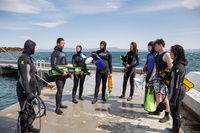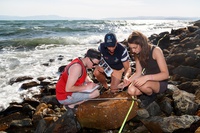Diving a hobby into a career
Yvette Barry, 24 Mar 2016.
How do you turn a hobby like SCUBA diving into a job? Ask 17-year-old Tasmanian Jakob Lister. The high school student grabs his dive gear and heads underwater every chance he gets. Now he’s grabbed the chance to steer his love of the ocean towards a career. He’s won a Redmap scholarship to join a Marine Biology course, run by the Institute for Marine and Antarctic Studies, on Maria Island in Tasmania this Easter. And this is just the start of his vocation in marine science.
“I would love to be given the opportunity to study the marine life of Maria Island as I aspire to study Marine Biology at the University of Tasmania,” Jakob says. “This has been my goal and dream since early high school.”
A few years back he was fortunate to do some work experience with Dr Sean Tracey at the Institute for Marine and Antarctic Studies (IMAS). Over the three days of work experience Jakob satellite-tagged southern blue fin tuna, looked at the decline in flathead numbers in Tasmanian waters and helped study the rate at which kelp affects the surfaces of its surrounding areas.
“This was the highlight of my high school years as it was an eye opening experience showing me that my hobbies could actually become a career,” he says.
Apart from College and Aussie Rules football, Jakob spends any free time diving and free-diving for lobster and abalone. And he’s already practicing his scientific observations.
“I have noticed that sea urchins are in large numbers where the crayfish are not."
The Temperate Marine Biology unit is run by the University of Tasmania’s Institute for Marine and Antarctic Studies (IMAS). The course provides Year 11 and 12 students with key concepts in marine biology plus hands-on research experience on Maria Island, Tasmania. Students will learn marine biology theory, sampling techniques, snorkeling and data collection.
The course is taught by marine biologist Dr Scott Ling, a Redmap verifying expert, and who has spent much of the past decade researching the range-extension of the long-spined sea urchin (Centrostephanus rodgersii) to the east coast of Tasmania including the reefs around Maria Island.
"Maria Island in Tasmania is the perfect marine environment to equip students with the practical field skills required to explore and study marine ecosystems," Dr Ling says.
"The course and field trip teaches skills of observation and the practical sampling methods required to understand the roles of a changing climate in shuffling species distributions, plus the impacts of other human activities such as fishing and pollution."
Jakob is stoked about winning the Redmap scholarship to cover the cost of the field trip (and I suspect his parents are too!). He sees the course as the springboard to launch into marine studies and a career in science.
“The camp as a whole would be an excellent opportunity for me to learn skills and gather knowledge that can only be learnt through an experience like this,” he says.
Are you a Year 11 or 12 student and interested in the Marine Biology courses run by the University of Tasmania and IMAS? Students from around Australia are welcome! Please contact Unit Coordinator Scott.Ling@utas.edu.au and check out: http://www.utas.edu.au/courses/imas/units/xas101-a-practical-introduction-to-temperate-marine-biology














